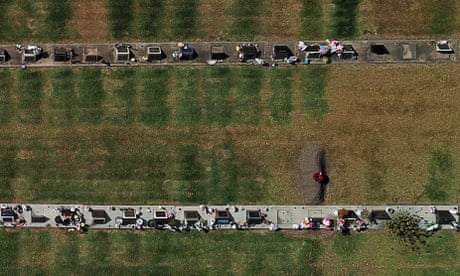- by foxnews
- 08 Apr 2025
Though all Australia felt the terror of Covid - this great trauma of 10,000 dead has not been shared | Brigid Delaney
Though all Australia felt the terror of Covid - this great trauma of 10,000 dead has not been shared | Brigid Delaney
- by theguardian
- 02 Jul 2022
- in news

It was on the face of it an odd thing to say - just one of the many odd things Donald Trump said in his time as president.
It was March 29 2020. A deadly virus was sweeping the world; China, Italy, and now the US. Bodies of the dead were being stored in refrigerated trucks outside mortuaries in New York. Less than two weeks later, work would start on a new mass burial ground outside the city on Hart Island.
By then 7,844 in New York state had died of Covid.
Trump, that day at the end of March 2020, said with a sort of stunned wonder: "I wish we could have our old life back. We had the greatest economy that we've ever had, and we didn't have death."
We didn't have death.
There's always been death, so what did he mean? He meant this kind of death, a new kind of death, a frighteningly different sort of death - that in those early days had the terror of randomness about it. It was death that came for you via the Amazon delivery guy, or the unwashed groceries, or standing too close to a stranger on the bus, or the bus itself or anywhere - or everywhere.
Normal death most of us file away to the back of our minds as something that will happen sometime, hopefully later rather than sooner. But in normal times, mortality does not slap us in the face over and over again, stunning us with the awful permanence, its complete randomness. If it did, we would be immobilised. And in a way, in the early days of the pandemic, we were.
This immobilisation took a couple of different forms. There was the government-mandated immobilisation - sort of like a game of statues, where everyone just froze in place and stood there for a very long time. And there was the existential immobilisation. Death is real. We didn't have death. And now we did.
Australia didn't want death. It had no truck with death. And so began the largest government program undertaken in my lifetime - maybe ever - to avoid death, in particular to avoid the certain kind of death we were seeing in other countries.
The Roman lawmaker Cicero quoted this Stoic maxim when he said: "The health of the people shall be the highest law."
And so it was in Australia, where heaven and earth were moved to keep people safe. International borders were shut for almost two years, workplaces and schools were closed, and punishment was visited upon those who left their designated area.
Although never articulated by those in power, there was implicit in many of these decisions towards safety an awareness about the huge psychic toll it takes on a nation to experience mass death from an unexpected event.
What was all this mass shutdown, this cessation of life - but a way to avoid the generation-defining effects of mass trauma? Of mass death?
Of course, there was no way of getting around the trauma. In avoiding one trauma (death) another was created (the trauma of life suspended).
But - ultimately - death did come. A virus will find a way.
At the beginning, when people started dying - Victoria's premier, Daniel Andrews, would start his daily press conference by listing the dead. Not their names. These have always been kept out of public discussion - and finding the names is the task of shoe-leather reporting work. But the premier would state their ages and where they were from.
In the early days those of us at home, immobilised, watching would search for a pattern in numbers of the dead. "One man in his 40s, two women in their 90s." Was it coming for us? Who was it coming for? Was it still random?
But things shift, they always do.
By mid to late 2021, there were vaccines. The press conferences stopped. The roll call of the dead stopped. But the death didn't stop. If anything, it accelerated.
We are now at 10,000 dead in Australia. The psychic cost of this many of our citizens dying from the pandemic is largely being borne now by their loved ones and those vulnerable to getting the worst of Covid - people at frontline, public-facing services, medical staff and the immunocompromised.
The shock (one of the shocks) at the start of the pandemic was that this great trauma would be shared among us equally - death distributed without care for class or colour.
But now a different reality has settled in; that this great trauma will not be shared. It will be individual and private and discrete. The trauma will not be collective because the names of the dead have not sunk into mass consciousness. The burden of this death will not be shared equally.
It was always thus, I suppose.
And this way of doing death, if anything, is a return to the natural way of things.
- by foxnews
- descember 09, 2016
Ancient settlement reveals remains of 1,800-year-old dog, baffling experts: 'Preserved quite well'
Archaeologists have recently unearthed the remarkably well-preserved remains of a dog from ancient Rome, shedding light on the widespread practice of ritual sacrifice in antiquity.
read more


